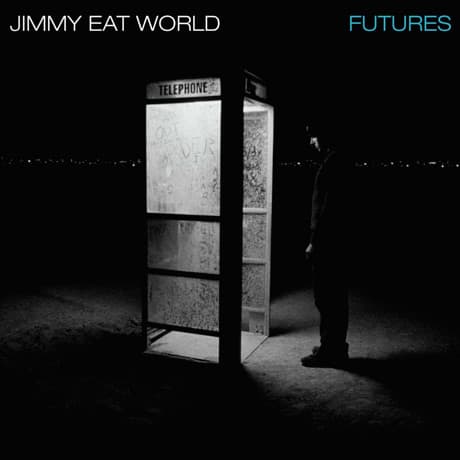The Jimmy Eat World that made Futures was a far cry from the one that made their predecessor, Bleed American. After the latter's success — a record made alone, in a vacuum — Futures was saddled with massive expectations to produce an equally massive follow up.
In retrospect, it seems obvious that the group would buck expectations — Jimmy Eat World are a band who always march to their own drum, for better or for worse. Today, Futures feels like the logical, if older and wiser, followup to Clarity, but at the time, the band's shift away from the buoyant pop-punk hooks of "the Middle" in favour of heavy arena rock felt like an abrupt left turn, particularly to new fans.
Chalk the sonic change up to producer Gil Norton, who took the reins after the band abandoned sessions with long-time producer Mark Trombino. Regarding lyrical change, one glance at the record's lyric sheet reveals that all wasn't right with Jimmy Eat World, singer-guitarist Jim Adkins in particular. Songs like "Drugs or Me" and "Pain" reveal a newfound layer of darkness to Adkins' typically introspective lyrics.
Still, Futures isn't the pity-party those songs might suggest. On tracks like "Work" (featuring guest vocals from Liz Phair) and epic closer "23" Adkins continues to take a romantic view of romance, even when it's doomed. And the title track, with its opening line "I always believed in futures/ I hope for better in November," would prove to be the most politicized song the band would ever write (the record was released weeks before the 2004 US elections).
Despite the shifts, Futures still managed to go gold, its singles finding sympathetic ears of radio programmers. Yet the band's move towards mainstream rock production — their guitars would never again shimmer like they do here — coincided with the underground rock scene finding its way out from under radio's narrow formatting tyranny. Even as they turned their backs on the mainstream that had embraced them, the underground that birthed them was morphing into something else entirely.
Futures remains the dark horse in Jimmy Eat World's discography, neither as popular as Bleed American nor as beloved as Clarity. But as this beautiful 180-gram coloured vinyl repress (complete with bonus track "Shame") suggests, it remains an important album for the group, pointing the way forward for the rest of their career and, heard ten years later, easily sits next to those other two records as the band's best work.
(SRC Vinyl)In retrospect, it seems obvious that the group would buck expectations — Jimmy Eat World are a band who always march to their own drum, for better or for worse. Today, Futures feels like the logical, if older and wiser, followup to Clarity, but at the time, the band's shift away from the buoyant pop-punk hooks of "the Middle" in favour of heavy arena rock felt like an abrupt left turn, particularly to new fans.
Chalk the sonic change up to producer Gil Norton, who took the reins after the band abandoned sessions with long-time producer Mark Trombino. Regarding lyrical change, one glance at the record's lyric sheet reveals that all wasn't right with Jimmy Eat World, singer-guitarist Jim Adkins in particular. Songs like "Drugs or Me" and "Pain" reveal a newfound layer of darkness to Adkins' typically introspective lyrics.
Still, Futures isn't the pity-party those songs might suggest. On tracks like "Work" (featuring guest vocals from Liz Phair) and epic closer "23" Adkins continues to take a romantic view of romance, even when it's doomed. And the title track, with its opening line "I always believed in futures/ I hope for better in November," would prove to be the most politicized song the band would ever write (the record was released weeks before the 2004 US elections).
Despite the shifts, Futures still managed to go gold, its singles finding sympathetic ears of radio programmers. Yet the band's move towards mainstream rock production — their guitars would never again shimmer like they do here — coincided with the underground rock scene finding its way out from under radio's narrow formatting tyranny. Even as they turned their backs on the mainstream that had embraced them, the underground that birthed them was morphing into something else entirely.
Futures remains the dark horse in Jimmy Eat World's discography, neither as popular as Bleed American nor as beloved as Clarity. But as this beautiful 180-gram coloured vinyl repress (complete with bonus track "Shame") suggests, it remains an important album for the group, pointing the way forward for the rest of their career and, heard ten years later, easily sits next to those other two records as the band's best work.
